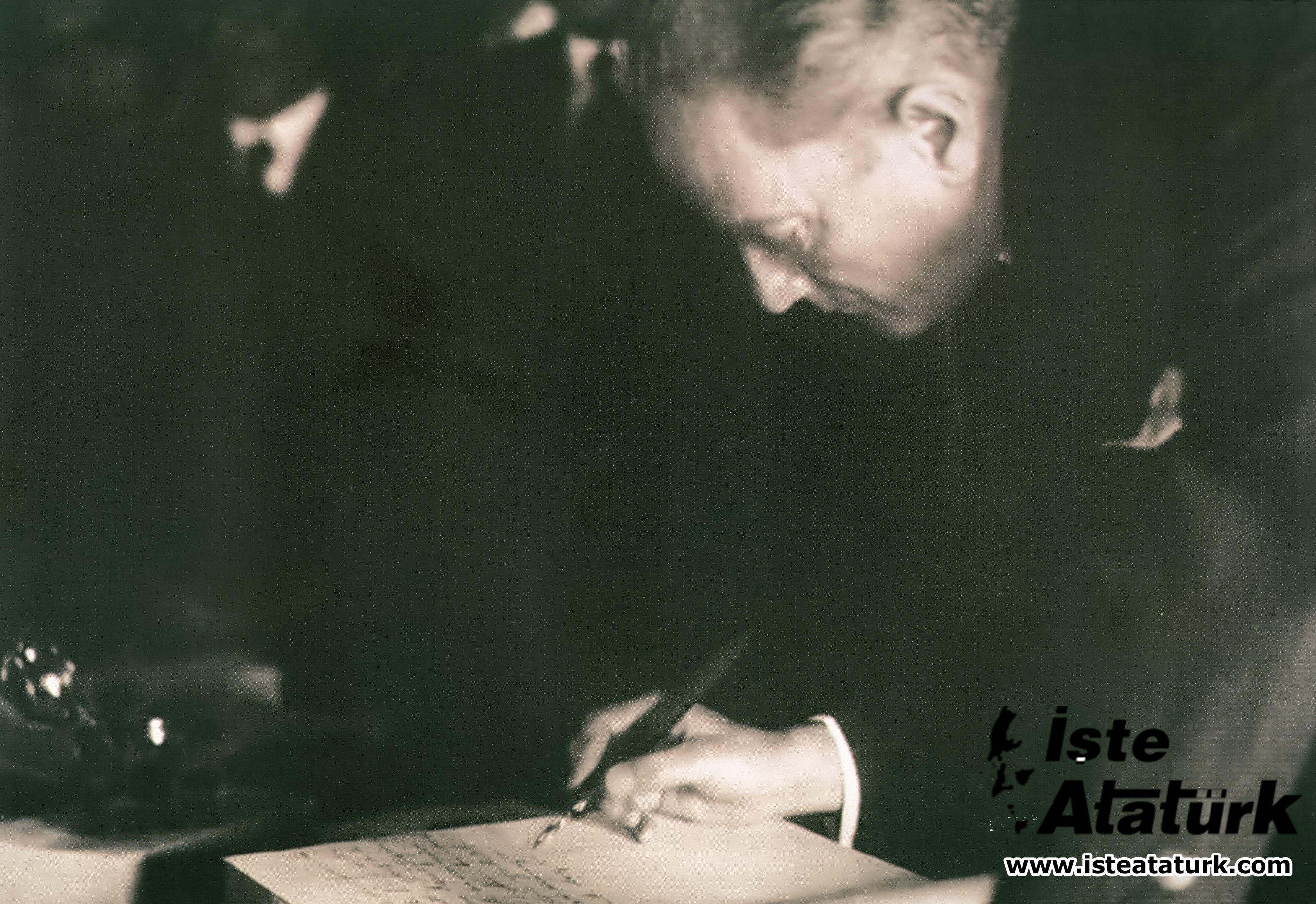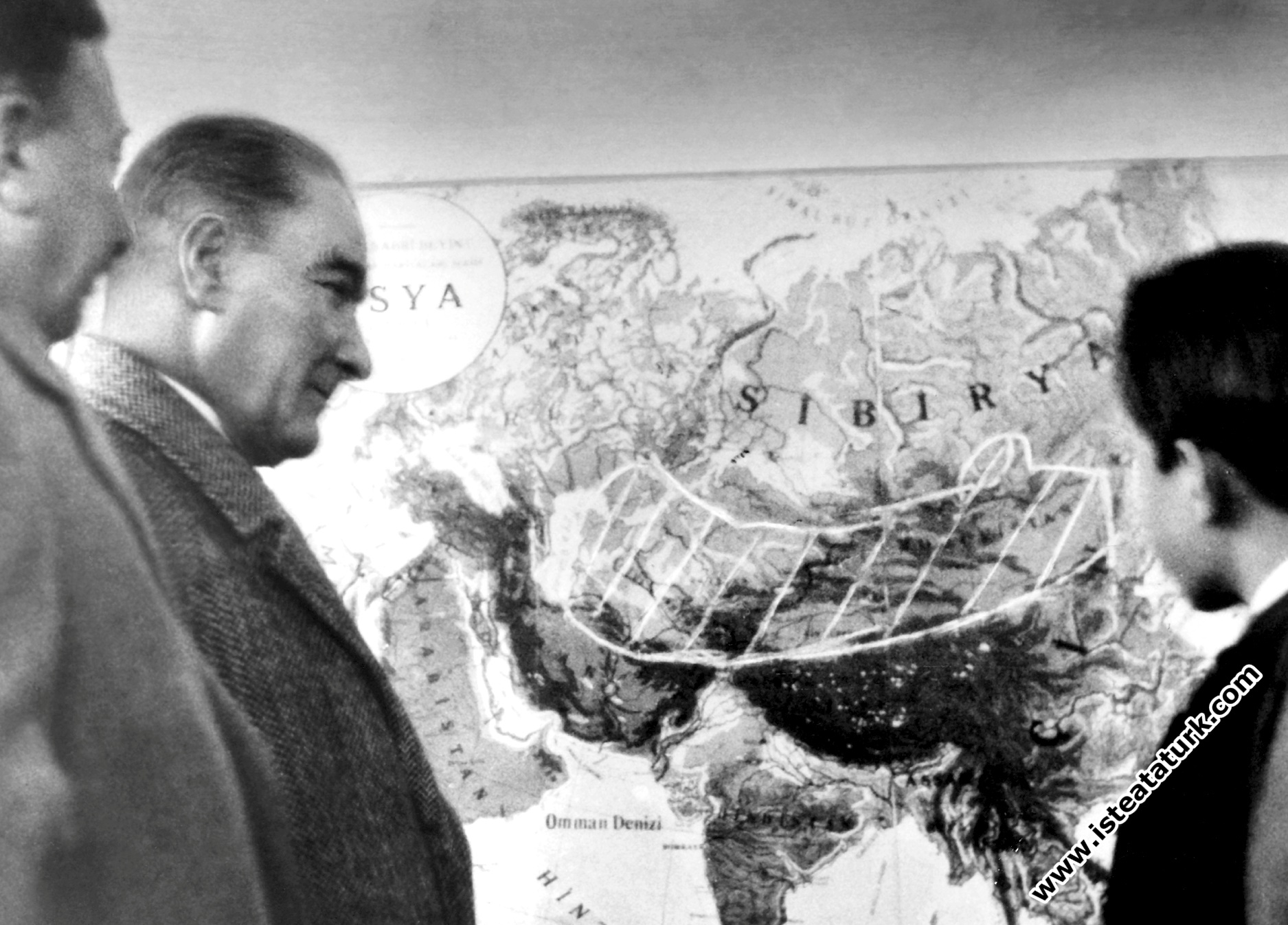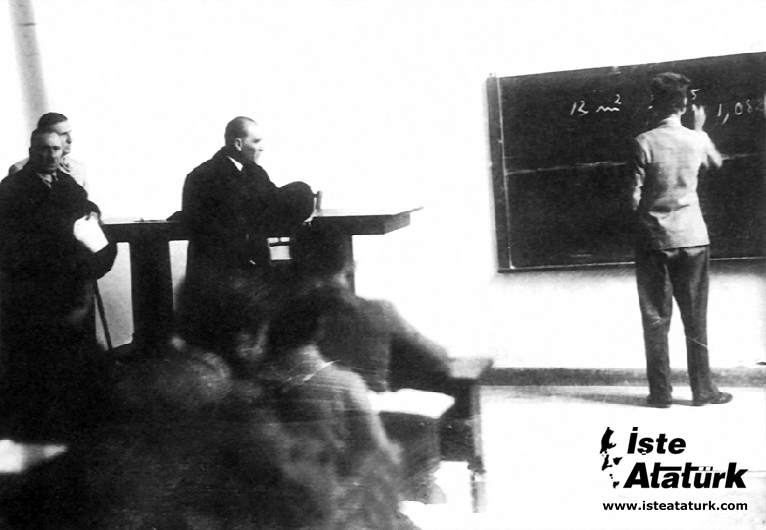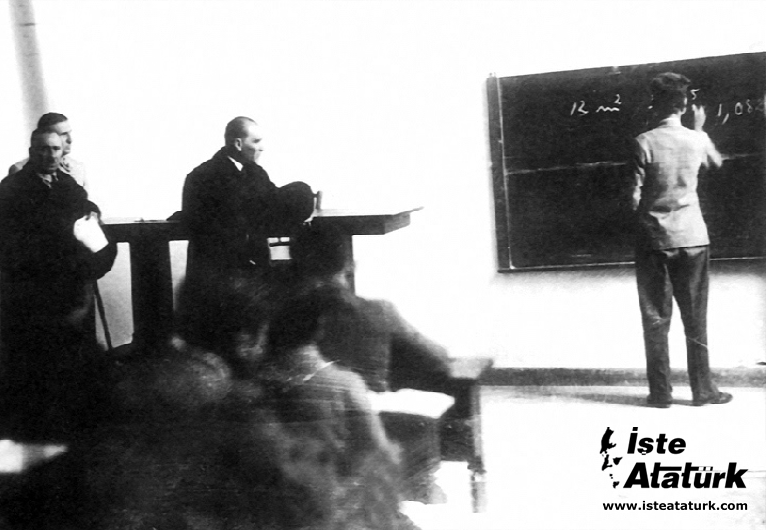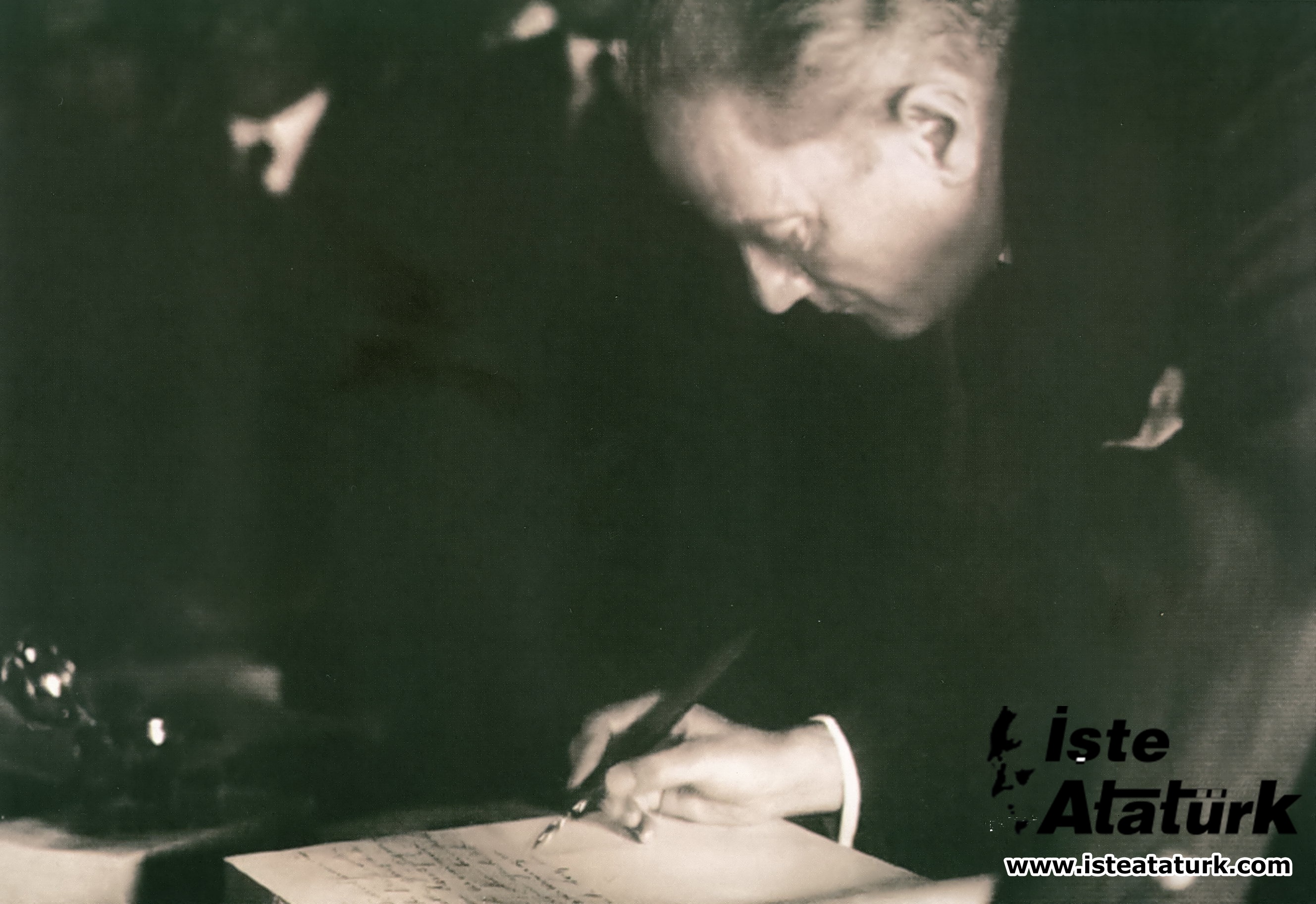
What the Republic Brings to Our Country and Individuals, Especially Turkish Women
Character Size
"You can be sure that Turkish women will work for the peace and security of the world by giving their hand to world womanhood." Mustafa Kemal Atatürk
What the Republic Brings to Our Country and Individuals, Especially Turkish Women
The Republic of Turkey is a national state that came to life with the struggle of the Turkish nation under the leadership of Atatürk, among the ruins of the Ottoman Empire, which was a multinational empire.
In order to understand what the Republic has brought to Turkish society, it is useful to first explain the Kemalist system of thought, which expresses the world view of the Republic of Turkey, in other words, Kemalism. Kemalism is a contemporary approach, the principles of which were born from the needs and desires of the Turkish society, aiming for the Turkish nation to reach the level of modern civilization as soon as possible as an advanced society under the guidance of reason and science, and to lead a happy life as an independent, equal and honorable member of the family of nations within democratic and secular rules. thought system.
The source of this system of thought stemmed from the realities of the country, the needs and wishes of the Turkish nation, and finally the leaves of Turkish history. In this respect, it is not a personal thought, but a symbol of our nation's common desires and tendencies, stemming from the national conscience. one
Kemalism, which accepts that science is the most genuine guide in life, will maintain its validity in the future, as it is today, with the value it attaches to rationality and science, and the principle of Revolutionism, which makes continuous renewal possible. Attaching great importance to this issue, Atatürk showed the way to be followed with the directive "The torch that the Turkish nation holds in its hands and minds on the path of progress and civilization".
Today, the Turkish nation owes everything beautiful, from its understanding of life to its modern appearance, to Atatürk and the Republic he founded. However, the understanding of life inherited from the Ottoman Empire was an understanding that was common among the society as "a bite, a cardigan" and made people sluggish by only pushing them to work for the other world. In this period of the Ottoman Empire, which began to experience the religious bigotry of the Middle Ages during its collapse, science, art, state life and social life were always dominated by this thought, ignoring reason, logic and science. For example, they divided science into three. Sciences that need to be learned, sciences that can be learned whether they are learned or not, and sciences that are sinful. According to them, religious sciences should be learned. But they said that it is okay whether you learn medicine or not. For God gives sickness and health, God takes it, so dealing with medicine is a waste of time. But if you deal with astronomy, if you observe the stars, you will be involved in the work of God, and then you will commit the greatest sin. This way of thinking first made the Ottoman Empire the sick man of Europe. Then it caused it to collapse.
Atatürk saved the Turkish homeland from the enemy occupation with his armed struggle, but he was not satisfied with this, he embarked on a new struggle. The name of this struggle was to establish a state with contemporary values. With the Republic of Turkey he founded, free-thinking people were raised. Innovations were made in all areas of social life. From the writing to the headdress, from the law to the calendar used, from the units of measure and weight to the consciousness of history and language, reforms were made in every field of social life with the Republic. Today, when Turkey is compared with its neighbors who started to move towards modernity in the geography where Turkey is located, it is much better understood what the Republic has brought to Turkey.
Let's briefly review these gains and what needs to be done to protect them.
First of all, the identity of the Turkish element, which formed the basis of the Republic of Turkey, was almost forgotten in the Ottoman Empire due to imperial policies. With the influence of the French Revolution and the encouragement of foreign states that wanted to divide the state, national movements began among the minority elements. On the other hand, the practices that were carried out to protect the state with its borders and that left national feelings in the background could not prevent the movements of the minorities and showed the greatest effect on the Turks. The Turks first brought their Ottomanism to the forefront rather than Turkishness due to the Ottomanism policy. After the Christian elements in the state were almost completely separated, this time the policy of Islamic unity was applied in order to keep the Muslim but non-Turkish elements.
One of the two main features of the Turkish Revolution, which was achieved under the leadership of Atatürk and the Turkish Revolution, is to be national and the other to be secular. He carried out studies in every field from history to language so that Turkish people could regain their national feelings. The Turkish Historical Society and the Turkish Language Society, which he founded, are the products of these studies. One of the aims of the breakthroughs made on the path of secularism is to break the religious bigotry that hinders national developments. By putting Turkishness to the forefront in everything he did and emphasizing the need to be proud of Turkishness, Atatürk tried to both regain self-confidence of our people and to establish the national consciousness, which is a necessity of being a national state, and he was successful in this.
The education inherited from the Ottoman Empire, on the other hand, was multi-headed and seemed far from responding to the needs of the society. There were institutions that provided secular education on the one hand and religious education on the other. Apart from these, there were foreign schools that were far from control. This multi-headed education was raising people with opposite and hostile views in the society. This problem was eliminated with the Law of Unification of Education, which was accepted by the Turkish Grand National Assembly on March 3, 1924. With this law, all Turkish schools were transformed into institutions providing secular education under the Ministry of National Education. Later, these places were put under strict control so that foreign and minority schools would not provide education contrary to these principles.
The sultanate and caliphate institutions were taken over from the Ottoman Empire, and these were abolished over time as appropriate conditions were obtained, and institutions with national sovereignty and secular principles were created. The Republic of Turkey, freed from the hump of sultanate and caliphate, is governed by secular laws accepted by the Turkish Grand National Assembly, whose members are chosen by the free will of the Turkish nation.
The Ottoman Empire was also economically bankrupt. The Duyun-u Umumiye Administration, which was established to collect the Ottoman debts, seized the revenues of the state. The majority of the industry, which was almost non-existent, belonged to foreigners. The railways in the country, on the other hand, were operated by foreigners, and they also obtained privileges on the routes of these roads.
Due to the capitulations, the Ottoman Empire could not independently take economic decisions in its own country, impose customs duties on its own, and apply the laws it applied to its own citizens to others.
Atatürk was a leader who interpreted independence as a whole and understood that countries that were economically dependent on foreign countries would not be fully independent. Therefore, a fierce battle was fought in Lausanne to gain economic independence. Having won this war, Turkey succeeded in removing all kinds of capitulations with the Treaty of Lausanne and gained its full independence. Although the Ottoman Empire had to pay a significant part of its debts, it provided its economic development. Attention was paid not to take new debts with the financial policies that focused on savings, which were implemented during the Atatürk period. Factories and railways held by foreigners were taken one by one and nationalized. Since the people did not have sufficient capital power, the state actively participated in the economy.
In the field of law, when the transition from the Ottoman State, where the Shari'ah provisions were implemented, to the Republic of Turkey, the Constitution and laws of the Republic were rearranged in accordance with secular principles.
Secularism is one of the foundations of the Turkish Republic. Important struggles were made during the Atatürk period for the establishment of secularism in Turkish society. In order for Turkey to take its place in the modern civilization more strongly, no concessions should be made in this regard. Because secularism does not struggle with religion, but against those who use religion for their own interests. Those who use religion for their own interests can only achieve these interests with their unenlightened minds. For this reason, care should be taken to raise enlightened people in education and secularism should be protected.
As stated above, the efforts to raise the Turkish nation, which was the main goal of the Turkish Republic and the Turkish Revolution, to the level of contemporary civilization and even above it, have been realized in all areas of social life. As a result, the Republic of Turkey has become the most modern and powerful country in its region and has become one of the few countries in the world.
The gains mentioned above have been provided to both men and women. However, with the Republic, the gains of women are much greater. In the Ottoman Empire, women were treated as second-class citizens and were isolated from social life, including education and business life. The right to marry many women granted to men made women ineffective even in family life. During the republican period, regulations that would give women the same rights as men were carried out with great speed. Equality of opportunity for men and women has been ensured in education, business life and politics. With the Civil Code of 1926, women were granted broad rights in family and social life, earlier than most western countries.
Women's rights in Turkey were achieved through a series of reforms during the transition period from the theocratic Ottoman Empire to the modern Turkish Republic, where equality between men and women was accepted. We can briefly review the developments in this regard as follows.
In Western societies, there have been intense struggles for centuries about women's rights and equality of women with men. Although there were some women's associations in the Ottoman Empire and the Republic of Turkey, they remained inadequate and lacked social support. 2 However, before many western countries, these rights were given to Turkish women by Atatürk, and they were even offered. Turkish women should consider themselves very lucky to have a leader like Mustafa Kemal Atatürk.
Evaluating the social position of Turkish women, who played a major role in the expulsion of the enemy by coping with all kinds of difficulties during the armed struggle days of the War of Independence, Mustafa Kemal made them look to the future with hope. The following statement he said about women in 1923 was a sign of what they would do about this issue. 3
"... If a society is content with attaining the modern necessities of only one of its kind, that society will suffer more than half of it. If a nation wants to develop, it has to accept this point as the main principle. It is necessary for both our men and women to obtain it at the same degree..."
In the Republic founded by Mustafa Kemal, who thought in this way, women first gained equality with men in education with the Law of Tevhîd-i Tedrisat on March 3, 1924. With the Civil Code, which was adopted in 1926 and freed Turkish women from the chain of "shariah", the regulations on polygamy and unilateral divorce of men were abolished, and women were given the right to divorce, the right to custody and the right to dispose of their property. The foundations of gender equality in family and social life were laid. With the Turkish Civil Code, which replaced the law based on religious foundations, called Mecelle, Turkish women began to get stronger, to find their personality, and to participate in social activities alongside their men.
After that, the developments related to women and women's rights can be listed as follows. 4
In 1927, a female lawyer, Bediye Hanım, was registered to the Istanbul Bar Association for the first time.
5 female chemists who graduated from Istanbul Science Faculty in 1928 are the first examples in this field for Turkey. This year, for the first time, a female student entered the Higher Engineering School.
With the "Law on the exemption of Turkish female doctors from compulsory service for a period of ten years" enacted in 1928, women who did not want to be doctors because they were afraid of compulsory service were enabled to show interest in the medical profession . As a matter of fact, from 1930 onwards, female doctors started to work.
In 1928, the Himaye-i Etfal Women's Society was established, with the aim of meeting the health and social needs of mothers and opening nurseries for working mothers.
In 1933, the Directorate of Technical Education for Girls was established in order to provide vocational education to girls.
In 1936, the Labor Law, which regulates the working life of women, came into force.
The first step for Turkish women to enter political life was III. With the Municipality Law No. 1580 dated 3.4.1930, which was passed during the Parliamentary period, women were given the right to elect and be elected as members of the Municipal Councils. 6 This will be followed by the constitutional amendment made in 1934 and the recognition of the right to elect and be elected as a deputy.
While women were able to obtain their right to vote and be elected in modern western societies, France in 1946 and in Switzerland in 1971, they have started to use this right in Turkey since 1934. However, it cannot be said that they use this right sufficiently. Because in the 1935 elections, when they obtained this right, 18 female members, who were deputies, made up 4.8% of the parliament, but this rate could not be reached again. 7 This situation shows the reluctance of Turkish women to use the rights they have acquired.
The equality provided to women in social life will soon begin to make itself felt. Women have started to perform successful services by showing interest in all kinds of professions. Having the title of being the first Turkish woman lawyer in the legal profession, which is one of the fields in which no Turkish woman has worked before, Beyhan Hanım attended her first hearing on 28 November 1928 at the Istanbul 1st Commercial Court. 8
Atatürk and the Republic, who gave these rights to women, also have expectations from them. Atatürk expressed these expectations on various occasions as follows.
On July 31, 1932, when Miss Turkey Keriman Halis was selected as Miss World in the competition held in Belgium, Atatürk gave her the title of "Ece" and addressed the Turkish woman as follows:
"Since I know from history that the Turkish race is the most beautiful race in the world, I found it very natural that one of the Turkish girls was chosen as the most beautiful of the world. However, I think it is necessary to remind the Turkish youth in this connection: Know that you should preserve your natural beauty, which we are proud of, in a scientific way and be vigilant in this way.. However, what we have to deal with is to hold the world championship with high culture and high virtue, just as your mothers and ancestors were."
The first international women's congress in the world was held in Istanbul on April 18, 1935 under the auspices of Atatürk, and women from all over the world attended this congress. Atatürk addresses the delegates of the "First International Women's Congress" as follows:
"You can be sure that Turkish women will work for the peace and security of the world by giving their hand to world womanhood."
Atatürk also expressed his belief that Turkish women will not lag behind men and European women in any field with these words:
"The real area of struggle for our women, the area where the real victory should be won, is to be adorned and equipped with light, knowledge and culture, real virtue, rather than success in form and disguise. I am one of those people who never doubted that they would be equipped with culture and who were absolutely sure of that."
Atatürk, who believes in the importance of family structure in the development and rise of Turkish society, says:
"This nation receives its basic education from the family. The Turkish nation has such mothers that these mothers raised the great men of each era. Turkish women are capable of raising greater generations."
Turkish women have the rights they have longed for for centuries; She received the most determined, faithful and strong support from Atatürk and surpassed the women of modern countries. With the reforms made, important steps were taken in the way of gender equality in Turkish society. Participation of every individual, male and female, has been ensured in Turkey's modernization and development. However, it cannot be said that Turkish women have fully exercised these rights, which have been rapidly provided since the foundation of the Republic. The existence of an unused right on paper is of no importance.
Turkish women should use their rights to the fullest in order to be worthy of Atatürk's trust in them, and in order to keep the Republic of Turkey, which is Atatürk's trust, alive forever as he wishes and to look to the future with confidence, they should work hand in hand with men and walk without compromising on the illuminated path shown by him. .
NOTE: This conference was given on behalf of Atatürk Research Center on November 3, 2003 at Atatürk Technical, Anatolian Vocational High School.
1 Utkan Kocatürk, "Ataturkism, Ataturk's Principles and Revolutions", Ataturkist Thought, Ataturk Research Center publication, Ankara 1992, p.83.
2 For more information on this subject, see Şefika Kurnaz, Turkish Women Before the Republic, Ministry of National Education publication, Istanbul, 1997.
3 Atatürk's Speeches and Statements II, p.89.
4 Cemal Avcı, The Structure and Operations of the Third Term Parliament. Atatürk Research Center Publication, Ankara 2000, p. 147-149.
5 Parliamentary Minutes, c:4, pp.239-240, 244-246; Official Gazette, 29.5.1928.
6 Official Gazette, 14.4.1930.
7 Emet Doğramacı, "Turkish Women in Politics", 75th Anniversary of the First Women's Meeting in Kastamonu, International Symposium, Ankara 1996, p.212.
8 Milliyet Newspaper, 29.11.1928.
Assist. Assoc. Dr. Cemal Avcı*
* Abant İzzet Baysal Üniversitesi Eğitim Fakültesi Orta Öğretim Sosyal Alanlar Bölüm Başkanı
Source: ATATÜRK ARAŞTIRMA MERKEZİ DERGİSİ, Sayı 57, Cilt: XIX, Kasım 2003
